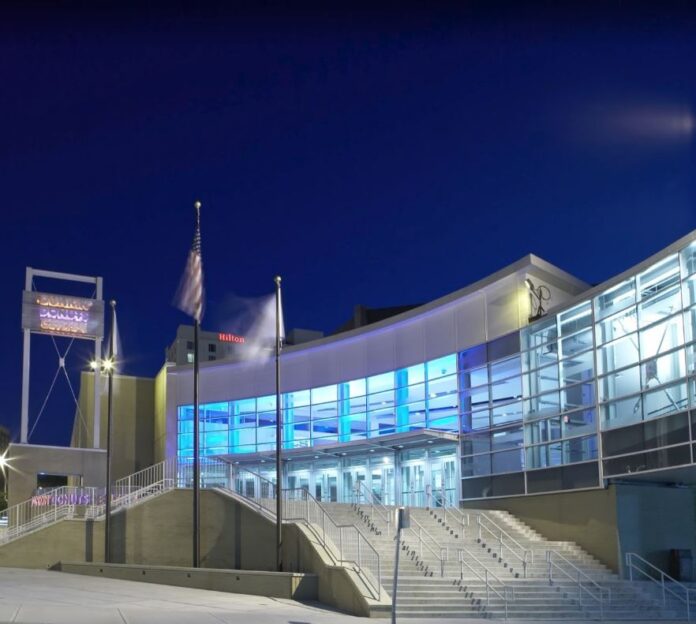
PROVIDENCE – Gov. Daniel J. McKee says it is up to individual businesses and venues that are operating in the state to craft their own COVID-19 safety precaution policies.
Alana O’Hare, a McKee spokesperson, said the governor is encouraging a piecemeal approach with individual businesses, including venues, crafting their own precaution policies aimed at keeping patrons safe.
“Right now, we are in a much different place than we were in March – Rhode Island is among the top five states in the nation for vaccinations, with 89% of our adult population partially vaccinated, and our test positivity has been among the lowest in the nation,” said O’Hare. “The governor continues to ask eligible Rhode Islanders to get vaccinated.”
The application of disparate standards by Rhode Island’s assorted venues in crafting their own safety precaution policies can be confusing for patrons when attending live events.
Some venues have mandates, some don’t.
Lee A. Esckilsen, an associate professor of sports, entertainment and event management at the College of Hospitality Management at Johnson & Wales University, said that while venues should adhere to state policy, some venues are adopting the rules desired by the touring company.
“COVID-19 policies at public assembly venues should be implemented that, at a minimum, abide by state policies,” he said. “If needed, venues may implement more stringent policies based on the venue, event and artist.”
Despite that, Esckilsen said a blanket policy for all of the state’s venues would not work.
“There are so many different types of public assembly venues and many have different capacities depending on how they are configured for the events they host,” he said.
In September, a coalition of venues banded together to require proof of vaccination and mask-wearing at events. Meanwhile, the state’s largest venue – the Dunkin’ Donuts Center and R.I. Convention Center – is not requiring proof of vaccination and has a mask policy that asks unvaccinated individuals to wear a mask while not eating or drinking.
Venues such as the Providence Performing Arts Center, Trinity Repertory Company, and the Veteran’s Memorial Auditorium, are requiring full proof of vaccination or proof of a negative COVID-19 PCR or antigen test. Face masks are required at those venues.
At the same time, the Dunkin’ Donuts Center and R.I. Convention Center, run by the R.I. Convention Center Authority, will not be requiring proof of vaccination unless asked to by an event operator. Unvaccinated guests are expected to wear a mask when not eating or drinking, but RICCA’s baseline policy is that guests should adhere to the policy themselves, without enforcement. Additionally, the authority will not require fully vaccinated people to wear a mask, leaving the opportunity for unvaccinated guests to skirt the rules if an operator does not impose stricter policies than RICCA.
The authority, is however, strongly recommending mask-wearing by everyone at its venues.
Dan McConaghy, executive director of the R.I. Convention Center Authority, a quasi-state entity, said the venue has two policies: To follow the guidance put forth by the R.I. Department of Health as a baseline; and to follow an event organizer’s desire for stricter policy.
McConaghy said that while RICCA had been silent on the issue before, it is now recommending that face masks be worn in its buildings. “The baseline is what the state dictates,” he said.
RICCA’s venues are managed by two entities: ASM Global and Professional Facilities Management, which manage the Dunkin’ Donuts Center and the R.I. Convention Center. PFM also manages the operation of PPAC and the Veteran’s Memorial Auditorium.
McConaghy noted that PFM follows a stricter set of COVID-19 policies. “PFM, as a third-party operator to us, follows [the rules used by theaters on New York City’s Broadway] and are requiring that people show proof of vaccination or test results before shows,” he said.
The same standard is used for many of the state’s performance venues.
Alan Chille, general manager of PPAC, said Broadway’s rules are predicated policy from the Actors’ Equity Association, a labor union representing American actors and stage managers working in the theater.
“We have mirrored our COVID policy based on the standards set in New York,” said Chille. “This is a combination of union/Equity requirements, coupled with the interest of public health and safety.”
Other venues have stricter protocols due to their location.
Leah Becki, the University of Rhode Island’s general manager of the Ryan Center and Boss Arena, said since the school’s venues are on campus they are held to a different standard than RICCA. The venues require proof of full vaccination and mask-wearing for large-capacity events.
“Protection of the campus community, including but not limited to students and staff, is of the utmost importance,” she said, noting that the school is “required to follow the university’s COVID-19 Task Force guidelines.”
Becki said from a venue standpoint the school would like to impose fewer restrictions, but its priority, in addition to hosting live entertainment, is providing a safe environment for students and local community members. “At this time, the university feels the only way to safely do that is to require masking, vaccination and/or COVID-19 testing requirements,” she said.
Becki said event size does play a role in what is required for safety, with the exception of masking. Since Aug. 12, masks have been required indoors on campus, she said.
“For smaller events that do not meet the university’s large event criteria, not over 250 [attendees], and 35% of capacity, we do not need to verify vaccinations or verify negative tests,” she said.
In contrast, Providence College’s men’s basketball games, which are held at the Dunkin’ Donuts Center, as of now, appear to not require proof of vaccination for entry. McConaghy said that if PC asks for stricter guidelines, RICCA would adhere to them. But the school had not as of yet. The college did not respond for comment.
Brown University, which is testing its vaccinated students after 82 students tested positive in early September, most of whom were vaccinated, is not also requiring proof of vaccination at its indoor venues.
Brian Clark, Brown University spokesman, said the school’s current policy is that attendees, regardless of vaccination status, wear masks for an indoor event on campus. He noted that a sporting event guest is considered, by definition, a limited-duration guest, so therefore no need to submit proof of or attest to vaccination status.
“The measures we have in place continue to evolve as the pandemic evolves and as we continue to evaluate conditions on campus and in Rhode Island,” Clark said. “So, all measures are subject to change at whatever point deemed appropriate – I can only share what measures are in place at any given time and for now, indoor masking is required. If that changes, we will update our community and post new information to the Healthy Brown website.”
Cassius Shuman is a PBN staff writer. Contact him at Shuman@PBN.com. You may also follow him on Twitter @CassiusShuman.












